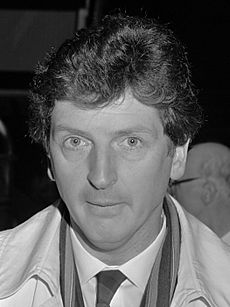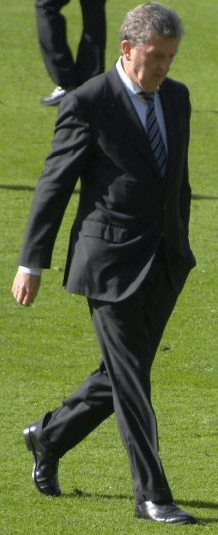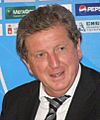Roy Hodgson facts for kids
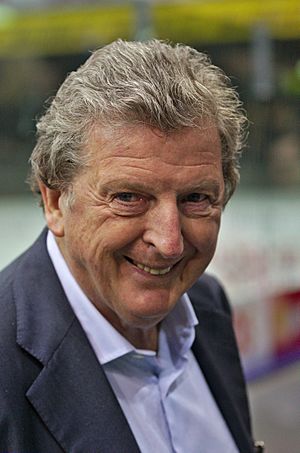
Hodgson in 2014
|
|||
| Personal information | |||
|---|---|---|---|
| Full name | Roy Hodgson | ||
| Date of birth | 9 August 1947 | ||
| Place of birth | Croydon, England | ||
| Height | 5 ft 10 in (1.78 m) | ||
| Position(s) | Left-back | ||
| Youth career | |||
| 1963–1965 | Crystal Palace | ||
| Senior career* | |||
| Years | Team | Apps | (Gls) |
| 1965–1966 | Crystal Palace | 0 | (0) |
| 1966–1969 | Tonbridge Angels | ||
| 1969–1971 | Gravesend & Northfleet | 59 | (1) |
| 1971–1972 | Maidstone United | ||
| 1972–1973 | Ashford Town (Kent) | ||
| 1973–1974 | Berea Park | ||
| 1974–1976 | Carshalton Athletic | ||
| Managerial career | |||
| 1976–1980 | Halmstad | ||
| 1982 | Bristol City | ||
| 1982 | Oddevold | ||
| 1983–1984 | Örebro | ||
| 1985–1989 | Malmö | ||
| 1990–1992 | Neuchâtel Xamax | ||
| 1992–1995 | Switzerland | ||
| 1995–1997 | Inter Milan | ||
| 1997–1998 | Blackburn Rovers | ||
| 1999 | Inter Milan (caretaker) | ||
| 1999–2000 | Grasshoppers | ||
| 2000–2001 | Copenhagen | ||
| 2001 | Udinese | ||
| 2002–2004 | United Arab Emirates | ||
| 2004–2005 | Viking | ||
| 2006–2007 | Finland | ||
| 2007–2010 | Fulham | ||
| 2010–2011 | Liverpool | ||
| 2011–2012 | West Bromwich Albion | ||
| 2012–2016 | England | ||
| 2013 | England U21 (caretaker) | ||
| 2017–2021 | Crystal Palace | ||
| 2022 | Watford | ||
| 2023–2024 | Crystal Palace | ||
| *Club domestic league appearances and goals | |||
Roy Hodgson (born 9 August 1947) is a famous English football manager and former player. He is known for managing 22 different teams in eight countries during his long career.
Hodgson's journey as a manager began in Sweden. He later led the Switzerland national team to the 1994 World Cup. This was a big deal because Switzerland had not played in a major tournament for almost 30 years. He also managed the national teams of Finland and England.
He has managed many famous clubs, including Inter Milan, Liverpool, and his childhood team, Crystal Palace. Hodgson is also a member of study groups for UEFA and FIFA, helping to analyze football at the highest level. He can speak five languages and has worked as a TV expert on football.
Contents
Early Life and Playing Career
Roy Hodgson was born in Croydon, a town in England. As a young boy, he loved football. He played for the youth team of Crystal Palace but didn't make it to the first team.
After leaving Crystal Palace, he played for several smaller clubs. At the same time, he trained to become a coach. He also worked as a physical education (PE) teacher to support himself. His playing career took him to different clubs in England and even to South Africa for a short time.
Managerial Career
Hodgson's career as a manager has taken him all over the world. He is known for his smart tactics and for improving the teams he manages.
Success in Sweden
Hodgson started managing in Sweden in 1976 with a team called Halmstad. Nobody expected them to do well, but Hodgson led them to win the league championship in his first year. He won it again in 1979. This success made him famous in Sweden.
Later, he managed Malmö and won five league championships in a row. He and his friend, manager Bob Houghton, changed how football was played in Sweden. They introduced a new defensive style called zonal marking, which was very effective.
Managing National Teams
Switzerland
In 1992, Hodgson became the manager of the Switzerland national team. The team had not qualified for a big tournament since 1966. Hodgson changed that by leading them to the 1994 World Cup in the United States. They reached the Round of 16. He also helped them qualify for Euro 1996.
Finland and England
From 2006 to 2007, Hodgson managed the Finland national team. He helped them reach their highest-ever FIFA world ranking.
In 2012, he was appointed manager of the England national team. He led the team at Euro 2012, where they reached the quarter-finals. He also managed England at the 2014 FIFA World Cup and Euro 2016.
Managing in the Premier League
Hodgson has managed several clubs in England's top league, the Premier League.
Fulham
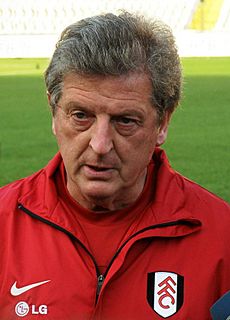
In 2007, Hodgson took over at Fulham when they were in danger of being relegated (sent down to a lower league). He saved them from relegation on the last day of the season.
The next season, he led Fulham to a seventh-place finish, their best ever in the Premier League. In 2010, he guided them on an amazing journey to the final of the UEFA Europa League. Although they lost the final to Atlético Madrid, it was a huge achievement for the club. For his work, he was named the LMA Manager of the Year.
Liverpool and West Bromwich Albion
In 2010, Hodgson became the manager of Liverpool, one of England's biggest clubs. His time there was short, and he left in 2011.
He then joined West Bromwich Albion and helped them avoid relegation. He led them to a 10th-place finish in the 2011–12 season, their best result in the top league for over 30 years.
Return to Crystal Palace
In 2017, Hodgson became the manager of Crystal Palace, the club he supported as a boy. The team had lost its first seven games of the season without scoring a goal. Hodgson turned things around and led them to an 11th-place finish, keeping them safely in the Premier League.
He managed the club until 2021. In 2019, he became the oldest person to manage a Premier League game. He returned to Palace in 2023 to once again help the team avoid relegation, before stepping down in February 2024.
Personal Life
Hodgson is married to Sheila, and they have a son named Christopher. He is known for being very intelligent and can speak several languages, including Swedish, German, and Italian.
He has received many awards for his services to football. In 2021, he was made a Commander of the Order of the British Empire (CBE). He has also received an honorary doctorate from the University of York.
Honours
Here are some of the major trophies and awards Roy Hodgson has won as a manager.
Team Trophies
- Halmstad
- Allsvenskan (Swedish League): 1976, 1979
- Malmö
- Swedish Champion: 1986, 1988
- Allsvenskan: 1985, 1986, 1987, 1988, 1989
- Svenska Cupen (Swedish Cup): 1985–86, 1988–89
- Copenhagen
- Danish Superliga: 2000–01
- Danish Super Cup: 2001
Individual Awards
- LMA Manager of the Year: 2010
- Premier League Manager of the Month: August 1997, December 1997, October 2009, February 2010
Images for kids
See also
 In Spanish: Roy Hodgson para niños
In Spanish: Roy Hodgson para niños
 | Jackie Robinson |
 | Jack Johnson |
 | Althea Gibson |
 | Arthur Ashe |
 | Muhammad Ali |


